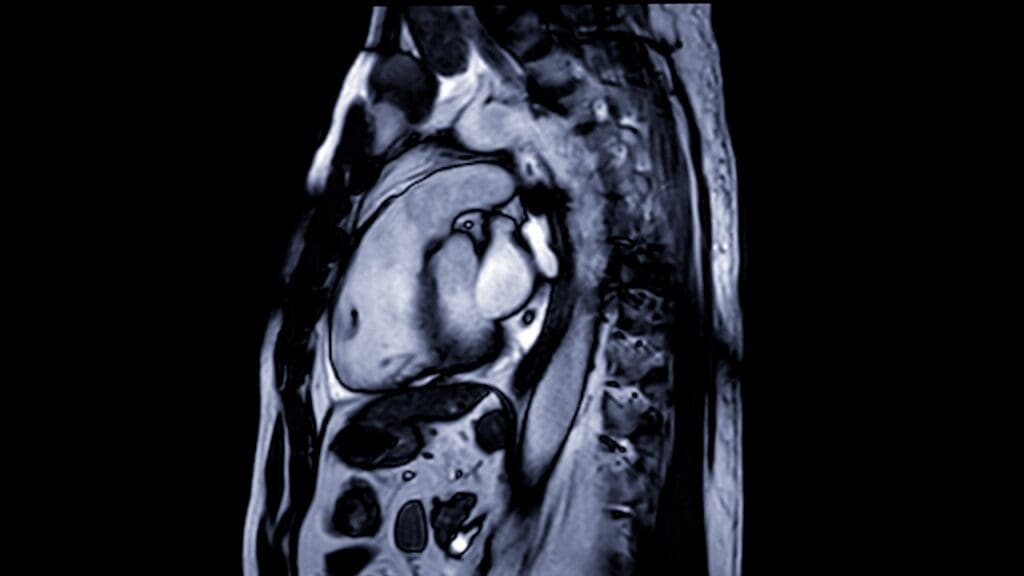Understanding Cardiac MRI Scan and Its Role in Heart Health
The heart is one of the most complex organs to visualize because it is located deep inside the rib cage, protected by bone structures, and constantly in motion. For this reason, examining the heart and its intricate functions requires highly advanced imaging technology and expert medical specialists. A Cardiac MRI Scan is an innovative imaging method that enables a detailed, non-invasive examination of the heart and surrounding vessels without the need for surgical procedures.
Liv Hospital Ulus Radiology Specialist Associate Professor Dr. Ayse Gormeli explains that the Cardiac MRI Scan provides an exceptional advantage in diagnosing, monitoring, and managing various heart diseases. This modern imaging technique offers clear and comprehensive results, helping doctors plan effective treatments while ensuring patient safety and comfort.

What Is a Cardiac MRI Scan
A Cardiac MRI Scan is an advanced medical imaging procedure that uses magnetic resonance technology to produce highly detailed images of the heart. Unlike conventional imaging methods that rely on X-rays or radiation, a Cardiac MRI Scan uses powerful magnetic fields and radio waves to capture clear images of the heart’s structure and function.
The major advantage of a Cardiac MRI Scan is that it provides an accurate evaluation of the heart muscle, valves, and blood vessels in three dimensions. This level of precision allows physicians to assess heart conditions with greater clarity, identifying even the smallest abnormalities. Because no ionizing radiation is involved, a Cardiac MRI Scan is considered one of the safest diagnostic methods available for both children and adults.
Cardiac MRI Scan for Children and Adults
One of the most significant advantages of the Cardiac MRI Scan is its safety for all age groups. Since it does not use radiation, it can be performed on children, adolescents, and adults alike. The contrast agent used during a Cardiac MRI Scan, when necessary, is also considered much safer than those used in other imaging methods like computed tomography.
Parents can feel at ease knowing that a Cardiac MRI Scan is entirely non-invasive and pain-free. During the examination, children do not experience discomfort, and the process is supervised by specialized radiologists to ensure a calm and stress-free experience. For pediatric cardiology, the Cardiac MRI Scan has become a preferred diagnostic method due to its precision and safety.
Conditions Diagnosed with Cardiac MRI Scan
A Cardiac MRI Scan is used to evaluate a wide range of heart-related conditions. One of its most important uses is in assessing heart muscle damage caused by vascular occlusion. This evaluation, known as a vitality test, helps determine whether a patient can benefit from heart surgery. By showing the extent of damage to the heart muscle, the Cardiac MRI Scan assists doctors in choosing the most effective treatment plan.
For congenital heart diseases, a Cardiac MRI Scan plays an essential role in both preoperative planning and postoperative follow-up. It provides clear images of heart chambers, valves, and large blood vessels, allowing doctors to assess structural abnormalities accurately. The information obtained from a Cardiac MRI Scan helps predict surgical risks and evaluate the long-term success of corrective procedures.
In patients with valvular disorders, the Cardiac MRI Scan is invaluable in determining the severity of the disease. It allows accurate measurement of how much blood flows backward through the valves, enabling specialists to diagnose valvular insufficiency or obstruction with precision.
Cardiac MRI Scan is also a valuable tool in identifying the causes of heart rhythm disorders, or arrhythmias. It can reveal underlying structural or tissue abnormalities that might be responsible for irregular heartbeats. Additionally, in patients with suspected heart masses, a Cardiac MRI Scan can distinguish between blood clots, benign tumors, and malignant tumors.
Beyond these applications, a Cardiac MRI Scan is also used to assess how the heart is affected by systemic diseases such as Mediterranean anemia (thalassemia), sarcoidosis, amyloidosis, and Anderson-Fabry disease. By evaluating the structure and function of the heart muscle, doctors can determine how far these diseases have progressed and plan appropriate treatment strategies.
When a Cardiac MRI Scan Is Not Suitable
Although a Cardiac MRI Scan is generally safe, it is not suitable for everyone. Patients with implanted devices such as pacemakers or other non-MRI-compatible materials should not undergo this procedure. These include certain prostheses, cochlear implants, or metallic fragments in the body.
Additionally, individuals with severe claustrophobia may find it difficult to tolerate the confined space of the MRI scanner. In such cases, the procedure can be performed under mild sedation to help the patient remain calm and still during the scan.
How a Cardiac MRI Scan Works
The process of a Cardiac MRI Scan begins by establishing a small intravenous line, usually in the arm. This allows the administration of a contrast agent if needed, to enhance the visibility of the heart’s structures and blood flow. Once the patient is positioned comfortably inside the MRI machine, electrodes are attached to the chest to monitor the heartbeat during the procedure.
During the scan, patients may be asked to hold their breath for short intervals. This helps reduce motion artifacts caused by breathing and ensures that the images are clear. The scan typically lasts between 30 and 45 minutes.
The Cardiac MRI Scan captures multiple detailed images from different angles, creating a three-dimensional model of the heart. This model provides doctors with a complete view of the heart’s anatomy and function. Once the imaging is complete, the data is analyzed by radiology and cardiology specialists to prepare a detailed report.
Patients are advised to avoid caffeine and heavy meals for a few hours before the procedure, as these can influence heart rate. After the scan, individuals can return to normal activities immediately since the Cardiac MRI Scan requires no recovery time.
The Advantages of Cardiac MRI Scan
The benefits of a Cardiac MRI Scan extend beyond safety and precision. One of the most remarkable features of this imaging technique is its ability to assess the heart in motion. Unlike traditional imaging methods, a Cardiac MRI Scan can capture real-time information about how the heart contracts, pumps blood, and functions during each heartbeat.
Another advantage is the clarity of the images produced. The Cardiac MRI Scan can identify tissue damage, inflammation, or scarring that may not be visible through other diagnostic tests. This makes it an essential tool for diagnosing early-stage heart disease.
Because it provides comprehensive information without the risks of radiation, the Cardiac MRI Scan is particularly valuable for patients who need frequent monitoring, such as those with chronic cardiac conditions or congenital heart defects.
The Role of Cardiac MRI Scan at Liv Hospital
Liv Hospital has become a leading institution in the use of advanced medical imaging technologies, including the Cardiac MRI Scan. With a team of experienced specialists and cutting-edge equipment, the hospital ensures precise and safe diagnostics for patients of all ages.
At Liv Hospital, each Cardiac MRI Scan is performed under expert supervision, ensuring maximum comfort and accuracy. The results are interpreted collaboratively by radiologists and cardiologists to ensure a comprehensive understanding of the patient’s condition. This multidisciplinary approach helps doctors design personalized treatment plans tailored to each patient’s needs.
Furthermore, the hospital emphasizes patient education and support, helping individuals understand their test results and make informed decisions about their health. Liv Hospital continues to lead in medical excellence by combining technological innovation with compassionate care.
Conclusion
A Cardiac MRI Scan represents one of the most advanced tools in cardiovascular medicine today. By providing a detailed and non-invasive view of the heart’s structure and function, it allows early diagnosis, accurate treatment planning, and effective follow-up for a wide range of heart diseases.
With its safety, precision, and versatility, the Cardiac MRI Scan has become a cornerstone of modern cardiology. At Liv Hospital, patients benefit from world-class imaging technology and expert medical care, ensuring that every heartbeat is examined with the highest level of accuracy and attention.
Liv Hospital Editorial Board has contributed to the publication of this content. The contents of this page are for informational purposes only. Please consult your doctor for diagnosis and treatment. The content of this page does not include information on medicinal healthcare at Liv Hospital.
* Liv Hospital Editorial Board has contributed to the publication of this content .
* Contents of this page is for informational purposes only. Please consult your doctor for diagnosis and treatment. The content of this page does not include information on medicinal health care at Liv Hospital .
For more information about our academic and training initiatives, visit Liv Hospital Academy
Frequently Asked Questions
What is a Cardiac MRI Scan?
A Cardiac MRI Scan is a non-invasive imaging test that uses magnetic fields and radio waves to create detailed 3D images of the heart.
Is the procedure safe?
Yes. It involves no radiation and is completely safe for both children and adults when performed under expert supervision.
Which conditions can it detect?
It helps diagnose heart muscle damage, valve disorders, congenital defects, arrhythmias, and other structural or functional heart problems.
How long does the scan take?
The scan usually lasts between 30 and 45 minutes, depending on the patient’s condition and whether contrast material is used.
Does a Cardiac MRI Scan cause pain?
No. The procedure is painless, though patients may need to stay still and hold their breath briefly during the imaging process.
Who should avoid a Cardiac MRI Scan?
It is not suitable for patients with non-MRI-compatible implants, pacemakers, or severe claustrophobia unless sedation is used.
Why choose Liv Hospital for a Cardiac MRI Scan?
Liv Hospital offers advanced imaging technology, expert radiologists, and personalized cardiac care for precise diagnosis and patient comfort.
